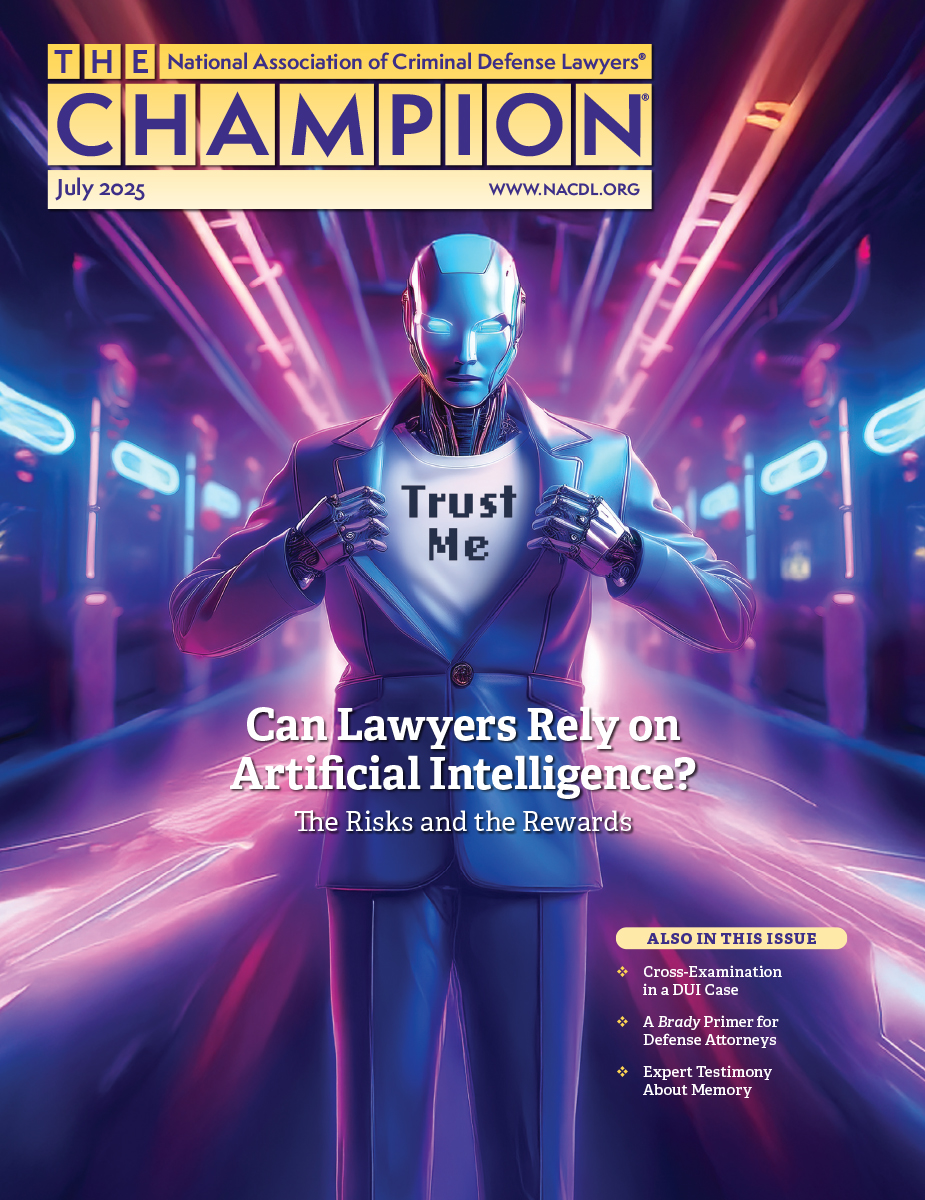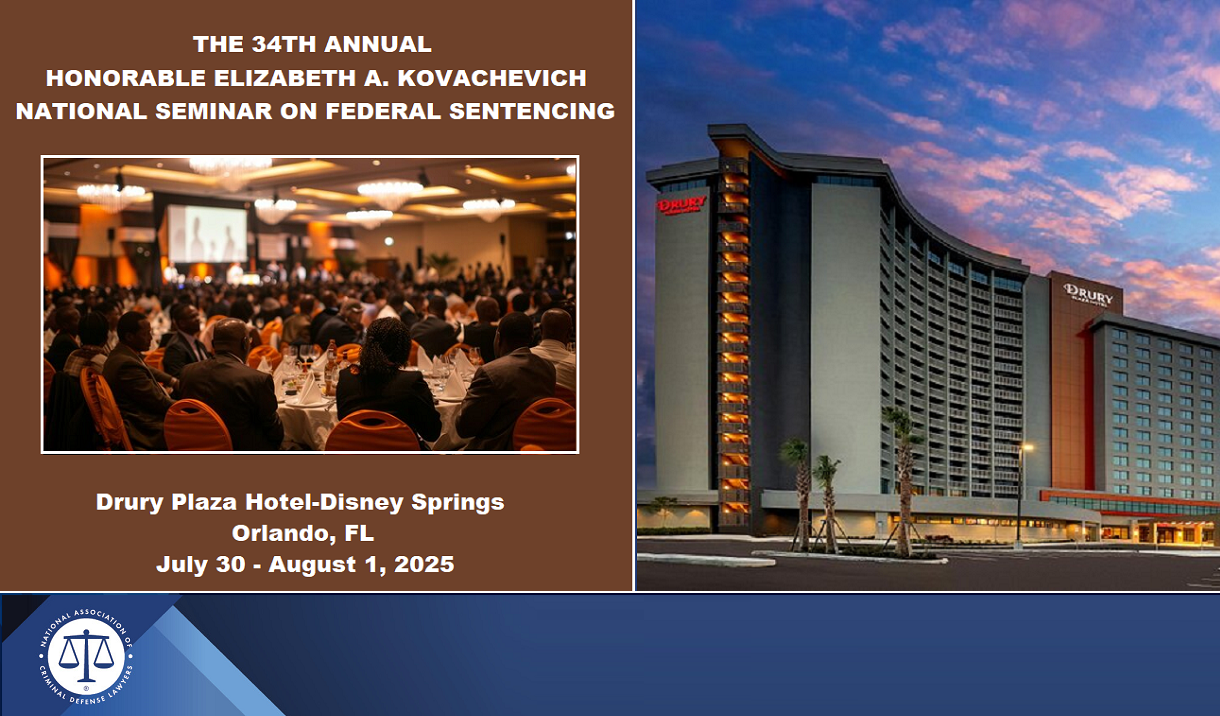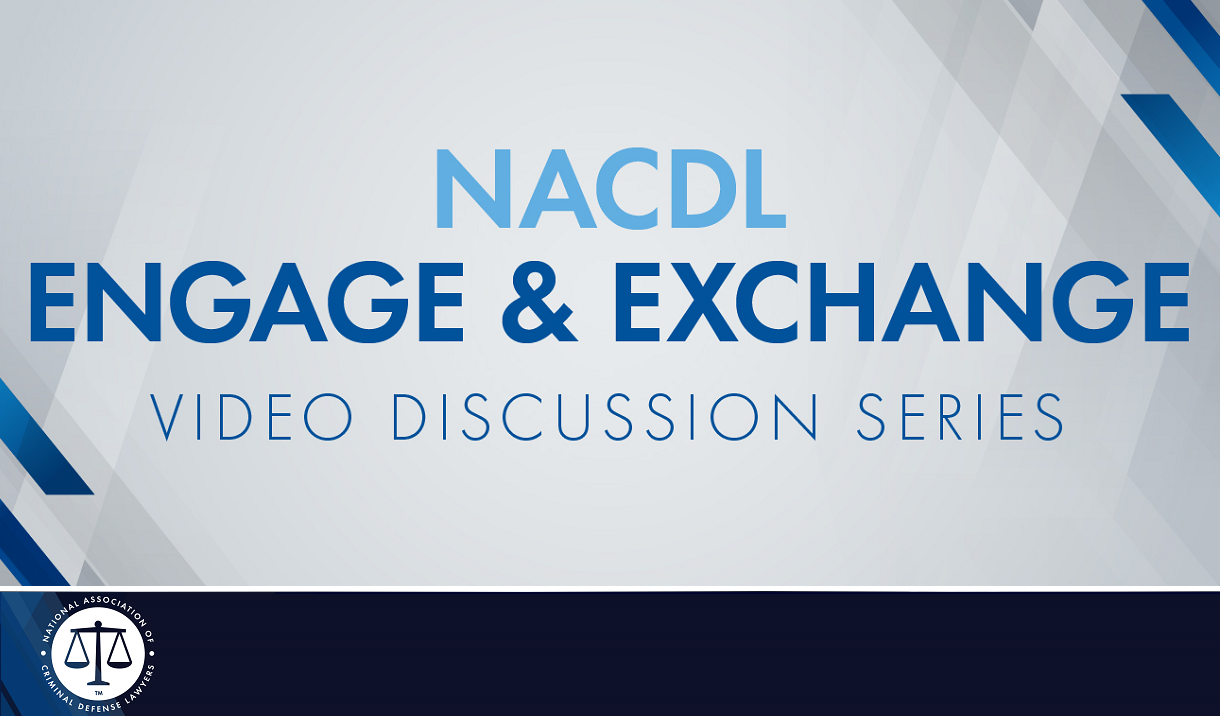Access to The Champion archive is one of many exclusive member benefits. It’s normally restricted to just NACDL members. However, this content, and others like it, is available to everyone in order to educate the public on why criminal justice reform is a necessity.
Defense lawyers have a tough job. We stand up not only in the courthouse, but also in the statehouse advocating for the rights of people accused of crime. There is no large constituency that supports the proper treatment of this group. And their interests are not often identified as even concomitant with the interests of society. But they are. Getting it right in criminal cases is a public safety issue and a civil rights issue. It is more difficult to convince decision makers of the value of a fair criminal justice system when offenses are mala in se1 than when they are mala prohibita.2 Perhaps it is because professionals can understand, even if they cannot sympathize, with white collar offenses. Whatever the reason, often it is tougher to get a court to listen in a drug, child pornography, child sexual assault, or death penalty case. Even though judges take an oath similar to the one we each took as lawyers, to uphold the Constitution, it seems that some forget or act as if exceptions apply. We joke about the drug case exception to the Fourth Amendment and the child sexual assault exception to the Sixth Amendment. But they seem very real in trial and appellate courts.
It is important for courts to display fidelity to the Constitution, thereby holding the awesome power of the state or the federal government in check in criminal proceedings. “When the government fears the people, there is liberty, when the people fear the government, there is tyranny.”3 If we allow the government to take the lives and liberty of its citizens, it ought not to be an easy thing to do. In light of the nearly unquestioned charging discretion enjoyed by the prosecution, it should fully bear the burden of proof beyond a reasonable doubt. State and federal governments should be required to comply with the law when pursuing a conviction. Reviewing courts should insist upon quality and honest legal decisions in the trial courts.
Justice Ginsberg reminded us this year in Herring v. United States,4 dissenting with Stevens, Souter, and Breyer, that the Fourth Amendment is a constraint on the sovereign, not only on its agents. It is a remedy that, in fact, ensures the right of persons to be free from unreasonable searches and seizures. It also maintains respect for the law by maintaining institutions not tainted by illegality.5
It is important that the courts uphold the Constitution and also act as guardians of their own integrity. Not only must courts be fair, they must also appear to be fair.6 When the courts accept evidence that was illegally obtained in order to secure a conviction, their proceedings are stained. Whether such evidence was obtained in violation of the Fourth Amendment or contrary to the Geneva Convention on Human Rights, its acceptance damages belief in government. Exclusion of evidence discourages the police from committing lawless acts and it assures the public that our courts are independent and trusted guardians of due process and the adversary system.
Recently, the Supreme Court harkened back to ancient7 complaints that “because the constable blundered, the criminal should not go free.” But if, as some modern jurists say, police officers are professionals, we should expect them to be and hold them to the standard of a reasonably well-trained officer. The courts should not accept the lowest common denominator, a blundering constabulary. If law enforcement officials fail to conduct themselves as reasonably well-trained officers, judges should suppress the evidence. Alarmists who claim that crime would run wild if we enforced constitutional rights have been proven wrong. Mapp v. Ohio8 did not destroy the ability of police to investigate.9 Miranda v. Arizona10 did not destroy interrogation as an investigative tool. Doyle v. Ohio11 did not prevent conviction of the guilty who invoked their rights to remain silent.
Our appellate and high courts should not engage in such sophisms. We criminal defense lawyers know that a law enforcement “blunder” often means the illegal arrest of the unfortunate, the wrongful separation of children from their parents, and the execution of the innocent. If the courts are to be honest about holding the police to the objectively ascertainable standard of a reasonably well-trained officer, they should not excuse the “blunders” of the “constable.” The integrity of justice and the courts, our liberty, and our very lives are at stake. If the Fourth Amendment is to mean what it says, the exclusionary rule must be equal to its violation. In the few short months since the Herring and Gant12 decisions, trial lawyers have seen an increase in clerical errors and auto inventory searches. Law enforcement responds to High Court pronouncements. And the manner in which they are doing so demonstrates that law enforcement still requires judicial deterrence from unlawful conduct.
It is not what judges say they will do when they take their oaths and colleagues gather to congratulate them, it is what they actually do when the choices are hard. Justice should shine when public attention is at its zenith as it was in Bush v. Gore,13 when the public eye is unaware of proceedings shrouded in national security as in Guantánamo, and in the pedestrian cases that come before courts every day. If justice can be less in any of these circumstances, it will always be less than what it should be.
The right to confrontation is the right to confront witnesses meaningfully. Fair proceedings include full disclosure of favorable evidence, not just reluctant revelation of exonerating evidence years after the conviction. In death penalty cases, this is often too late.
To fulfill their role, courts must stand firm on constitutional rights. While the Sixth Amendment confrontation clause, right to trial by jury, and right to counsel of choice were weakened over the last few decades, they have been strengthened by more recent Supreme Court and trial court decisions.14 Similarly, judges should insist that prosecutors reveal impeaching and other favorable evidence or punish its non-disclosure. U.S. District Judge Emmet G. Sullivan ordered the dismissal of former Senator Ted Stevens’ conviction because the Department of Justice Public Integrity Section hid favorable evidence in his case. It was impeaching evidence that was useful to his defense. It was evidence that, in fairness, the jury should have heard.15
We all have those conversations about judges. Does he follow the law? Does this judge insist that the prosecutor follow the law? Is she fair? Does she uphold the Constitution? Or is this a judge that appears to believe that the burden on the prosecution is too high and thus needs his help and that of the jurors?
Those judges who will suppress evidence, order the production of Brady and Giglio evidence, dismiss cases, or overturn convictions when it is the right thing to do are among the most respected. Before such judges, prosecutors counsel better police work. Before such a bench, the process is fair and we can be more certain of correct results. To such judges we can entrust life and liberty.
Notes
- Evil in itself.
- Wrong because prohibited.
- A quote wrongly attributed to Thomas Jefferson, but which sentiments were expressed in Thomas Jefferson, The Works of Thomas Jefferson, Vol. 1 (Ana 1760-1770).
- 129 S. Ct. 365.
- “Beyond doubt, a main objective of the rule ‘is to deter – to compel respect for the constitutional guaranty in the only effectively available way – by removing the incentive to disregard it.’ Elkins v. United States, , 217 (1960). But the rule also serves other important purposes: It ‘enabl[es] the judiciary to avoid the taint of partnership in official lawlessness,’ and it ‘assur[es] the people – all potential victims of unlawful government conduct – that the government would not profit from its lawless behavior, thus minimizing the risk of seriously undermining popular trust in government.’” Herring v. United States, 555 U.S. ___ (Ginsberg, J., dissenting).
- In Caperton v. Massey, No. 08-22 (June 8, 2009), the U.S. Supreme Court held that recusal of a judge does not require proof of actual bias.
- This was the complaint of Justice Cardozo over 80 years ago. Id.
- 367 U.S. 643 (1961).
- Justice Clark, writing for the Court, stated: “The criminal goes free, if he must, but it is the law that sets him free. Nothing can destroy a government more quickly than its failure to observe its own laws. …” 367 U.S. at 659.
- 284 U.S. 386 (1966).
- 426 U.S. 610 (1971).
- No. 07-542 (April 21, 2009).
- 531 U.S. 98 (2000).
- Crawford v. Washington, 541 U.S. 35 (2004) (admission of hearsay violates right to confrontation); Melendez-Diaz v. Massachusetts, No. 07-591 (June 25, 2009) (requiring live testimony of lab scientists and mentioning the despicable practice of “dry labbing”); Booker v. United States, 543 U.S. 220 (2005) (mandatory guidelines violate right to trial by jury); United States v. Gonzalez-Lopez, No. 05-352 (June 26, 2006) (right to counsel of choosing); United States v. Stein et al., 541 F.3d 130 (2d Cir. 2008) (upholding Judge Kaplan’s dismissal of 13 defendants because of unconstitutional interference of their right to counsel, naming prosecutors’ names).
- See also United States v. Reyes, 2009 WL 2501920 (9th Cir. 2009) (prosecutor’s false statement in closing argument about knowledge of back dated options by finance departments required reversal); United States v. Grace, Cause No. CR05-07-M-DWM (D. Mont. 2009) (Judge Malloy instructed jurors that the government had committed an “inexcusable dereliction of duty” by not providing defense lawyers information about a star witness’s relationship with the government; the defendants were acquitted).













